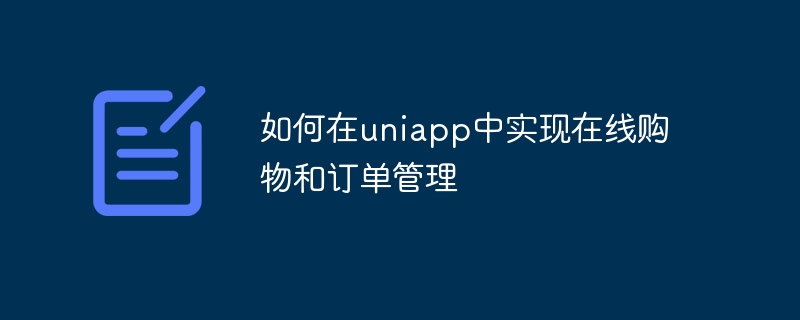Home >Web Front-end >uni-app >How to implement online shopping and order management in uniapp
How to implement online shopping and order management in uniapp
- 王林Original
- 2023-10-27 14:10:561587browse

How to implement online shopping and order management in uniapp
With the development of the Internet, e-commerce has become an indispensable part of modern society. In terms of mobile devices, uniapp, as a cross-platform development framework, can help developers quickly build multi-terminal applications. This article will introduce how to implement online shopping and order management functions in uniapp and provide some specific code examples.
First, you need to create a uniapp project and configure the corresponding environment and dependencies.
The key to realizing online shopping in uniapp is to be able to display product lists, add products to the shopping cart, submit orders and other functions. The following are the specific implementation steps and code examples:
- Creating a product list page:
In uniapp, you can use vue's template syntax to write the page. On the product list page, you can display product name, price, pictures and other information. You can use the components provided by uniapp to display the list.
<template>
<view>
<view v-for="item in goodsList" :key="item.id">
<image :src="item.imageUrl"></image>
<text>{{item.name}}</text>
<text>{{item.price}}</text>
<button @click="addToCart(item)">加入购物车</button>
</view>
</view>
</template>- Add products to the shopping cart:
When the user clicks the "Add to Shopping Cart" button, the corresponding product can be added to the shopping cart. You can use vuex to manage the status of the shopping cart.
// store.js
const store = {
state: {
cartList: []
},
mutations: {
addToCart(state, good) {
state.cartList.push(good)
}
}
}
// 商品列表组件
<template>
<button @click="addToCart(item)">加入购物车</button>
</template>
<script>
export default {
methods: {
addToCart(item) {
this.$store.commit('addToCart', item)
}
}
}
</script>- Shopping cart page display and order submission:
On the shopping cart page, you can display the list of products that the user has added to the shopping cart. Users can select the quantity of goods and click the submit order button to generate an order.
The generation of orders can be completed on the front end, or it can be processed by passing the product information to the back-end server.
<template>
<view>
<view v-for="item in cartList" :key="item.id">
<image :src="item.imageUrl"></image>
<text>{{item.name}}</text>
<text>{{item.price}}</text>
<input type="number" :value="item.num" @change="updateNum(item, $event.target.value)">
</view>
<button @click="submitOrder">提交订单</button>
</view>
</template>
<script>
export default {
computed: {
cartList() {
return this.$store.state.cartList
}
},
methods: {
updateNum(item, num) {
item.num = num
},
submitOrder() {
const orderList = this.cartList.filter(item => item.num > 0)
// 将订单信息传递给后端服务器进行处理
// ...
// 清空购物车
this.$store.state.cartList = []
}
}
}
</script>Through the above steps, we can implement simple online shopping and order management functions in uniapp. Of course, the specific implementation still needs to be adjusted and expanded according to actual needs. I hope the above content can be helpful to you, and I wish you happy programming!
The above is the detailed content of How to implement online shopping and order management in uniapp. For more information, please follow other related articles on the PHP Chinese website!
Related articles
See more- Does Empire CMS have an order management system?
- How to click the button in uniapp to realize the jump interface
- PHP development of an enterprise resource planning (ERP) system that builds customer order management functions
- How to develop a simple online shopping system using MySQL and Java
- How to develop a simple online order management system using MySQL and Ruby on Rails

